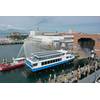Profiles in Training: Capt. Ted Morley, MPT

Captain Ted Morley is a ubiquitous figure in maritime training circles, the COO and Academic Principal at MPT in Fort Lauderdales. MPT consistently enrolls more than 10,000 students annually, catering to the whole maritime market from super yachts to super tankers and everything in between. He shares his insights on how the current pandemic is changing maritime training, now and in the future.
How have you altered your operations due to the pandemic?
Even before COVID-19 we designed our main campus to fight viruses and improve air quality. We have UV sterilizers in our AC system and hospital grade hepa filtration, along with hydroxyl units and disinfectant fogging systems. We also pre-filter and pre-condition all the air coming into the building. Currently we are expanding our online portal to include virtual classrooms and more distance learning options.
Had you previously offered distance learning alternatives?
The USCG and other regulators have very strict guidelines on what courses be delivered online. STCW, by its very nature, requires hands on learning and assessments but we are all learning and adapting.
How do you think this pandemic will impact the way in which maritime training and education is delivered in the future?
Long term I see a blended approach to learning. It is difficult to self-study with many of the more technical courses and the hands-on portions will always require a “bricks and mortar” facility.
Which technologies do you view as most promising to deliver maritime training more effectively and efficiently?
Video conferencing and virtual simulations will play a larger role. Efficient yet safe classrooms are a must. The level of technology and infrastructure to effectively deliver and measure the students’ knowledge, understanding, and competence levels will continue to rise. The blended approach will allow students to receive the classroom material early, review and develop a baseline, complete pre-entry familiarization, and then be ready to shift to a classroom setting to complete the learning process and the assessment criteria as established by the STCW Code and the various regulatory agencies.
Related News



